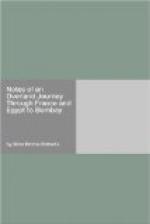This severe over-employment, however, entailed the inevitable penalty, loss of health, and in 1832, being now bound by no powerful tie to India, and looking forward, perhaps, with innocent ambition, to a less confined theatre for the display of her talents and acquisitions, she quitted the country, and returned to England, the voyage completely repairing the injury which the climate of India had wrought upon her constitution. The reputation she had acquired preceded her to this country, where she had many literary acquaintances, some of whom had reached a high station in public esteem; and her entrance into the best literary circles of the metropolis was thereby facilitated; but the position which she was entitled to claim was spontaneously conceded to talents such as hers, set off by engaging and unaffected manners, warmth and benevolence of heart, equanimity and serenity of temper.
The fruits of her observations in the East were given to the world in several series of admirable papers, published in the Asiatic Journal,[A] a periodical work to which she contributed with indefatigable zeal and success, from shortly after her return to England until her death. A selection of those papers was published, in three volumes, in 1835, under the title of Scenes and Characteristics of Hindostan, which has had a large circulation, and (a very unusual circumstance attending works on Indian subjects) soon reached a second edition. This work established Miss Roberts’s reputation as a writer of unrivalled excellence in this province, which demands a union of quick and acute discernment with the faculty of vivid and graphic delineation. Of the many attempts which have been made in this country to furnish popular draughts of Indian “Scenes and Characteristics,” that of Miss Roberts is the only one which has perfectly succeeded.
Her pen now came into extensive requisition, and the miscellaneous information with which she had stored her mind enabled her, with the aid of great fluency of composition and unremitted industry, to perform a quantity and a variety of literary labour, astonishing to her friends, when they considered that Miss Roberts did not seclude herself from society, but mixed in parties, where her conversational talents rendered her highly acceptable, and carried on, besides, a very extensive correspondence. History, biography, poetry, tales, local descriptions, foreign correspondence, didactic essays, even the culinary art, by turns employed her versatile powers. Most of these compositions were occasional pieces, furnished to periodical works; to some she attached her name, and a few were separately published. Amongst the latter is a very pleasing biographical sketch of Mrs. Maclean (formerly Miss Landon), one of her oldest and dearest friends.




